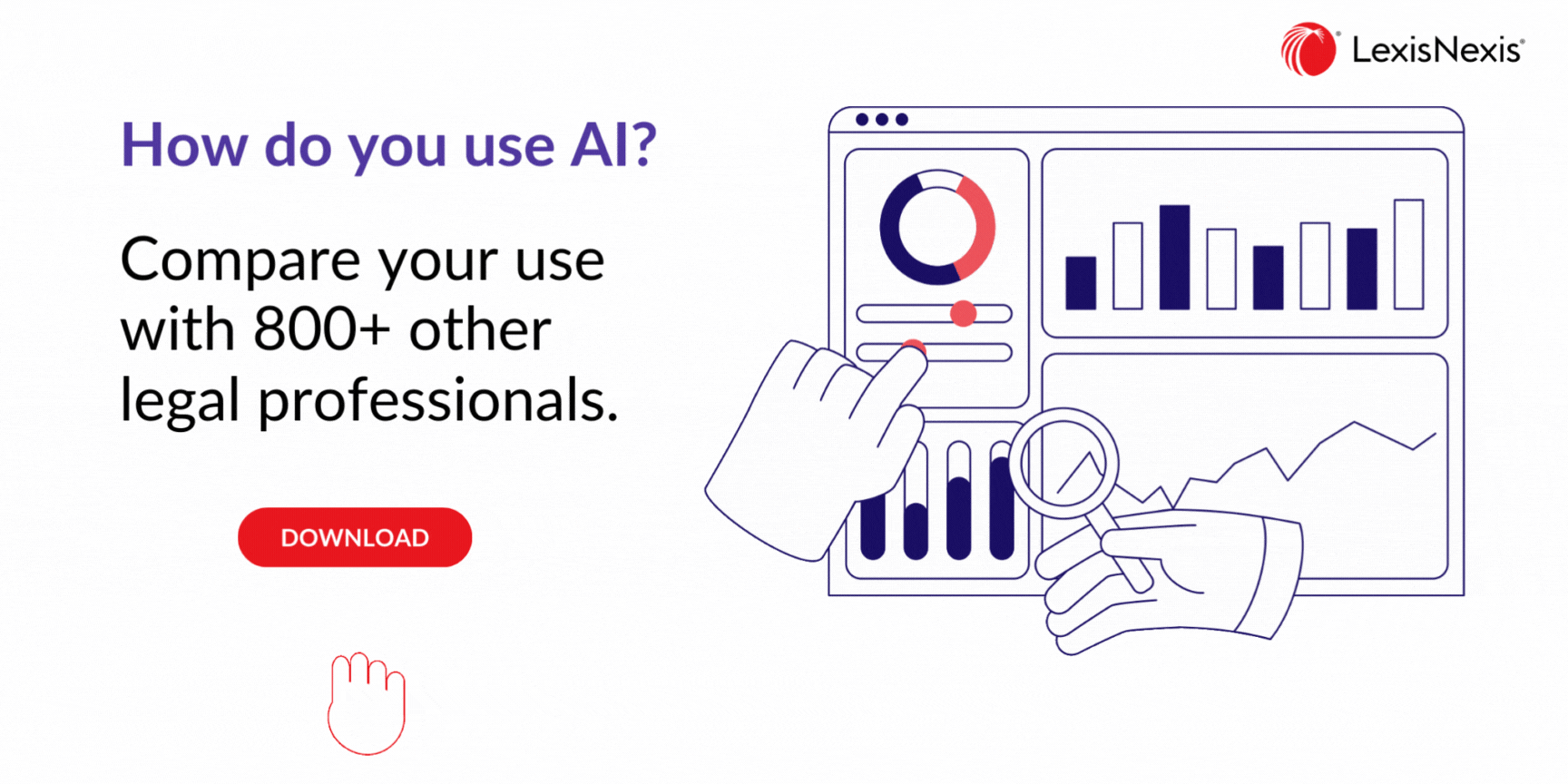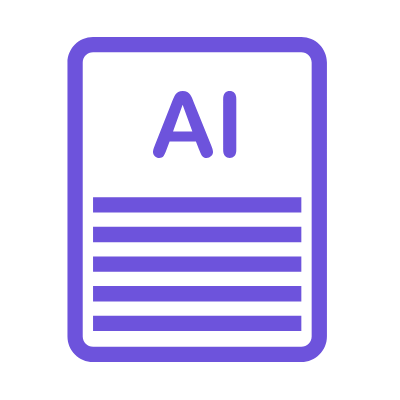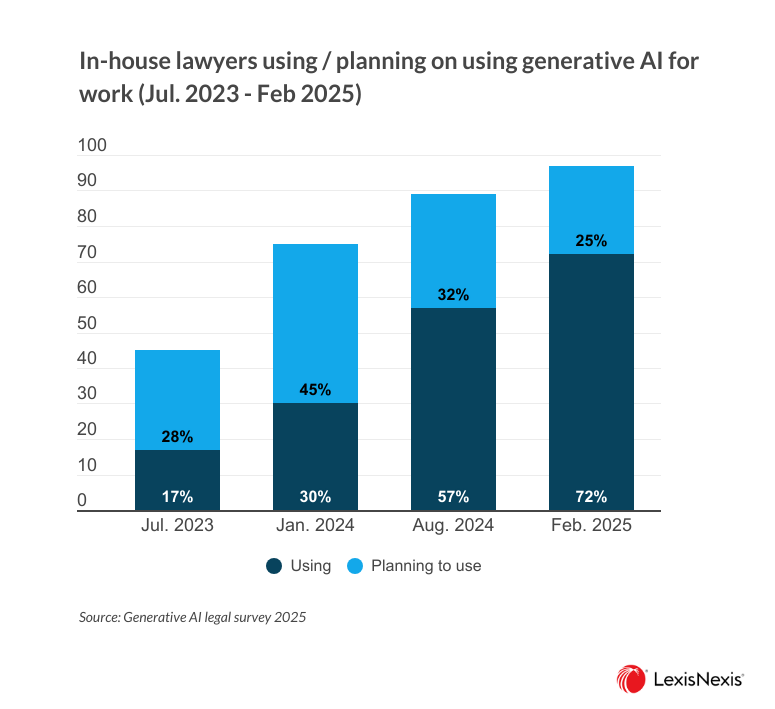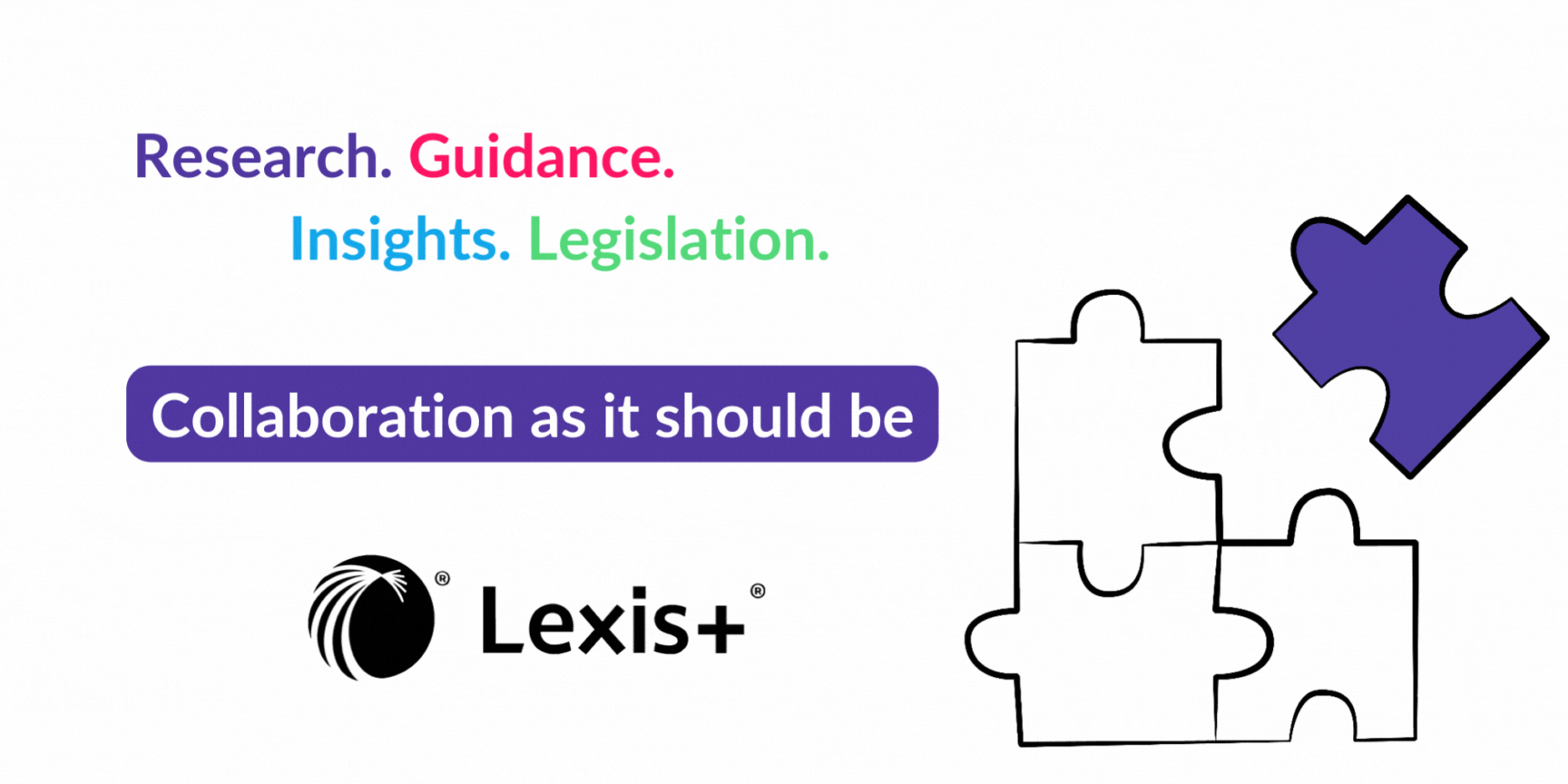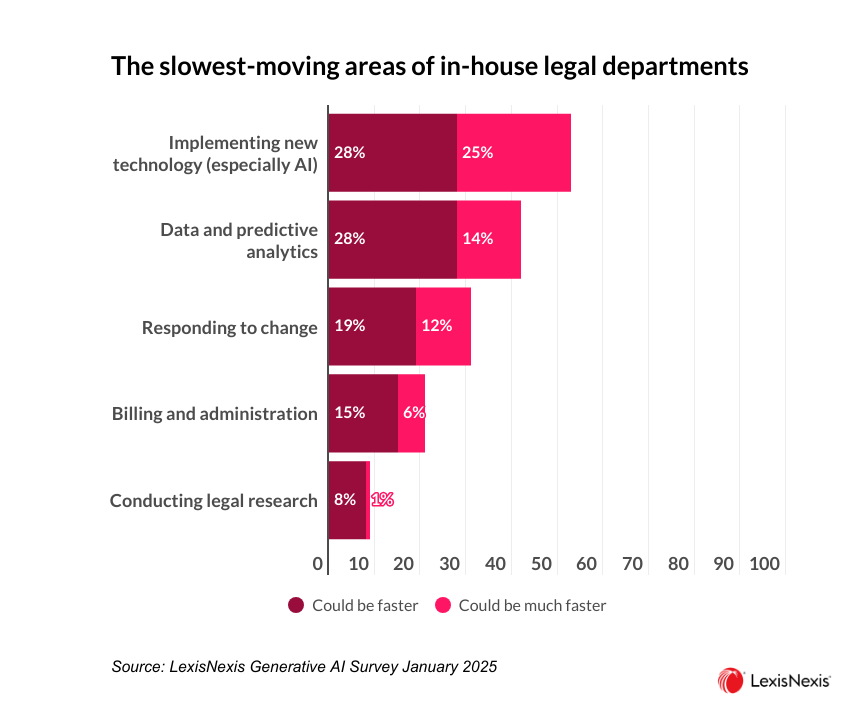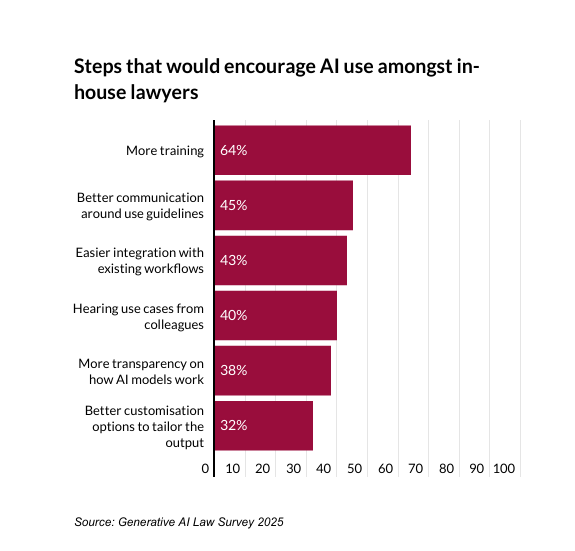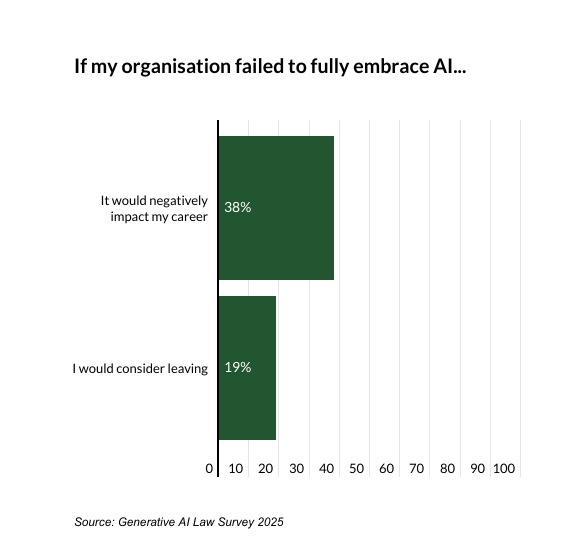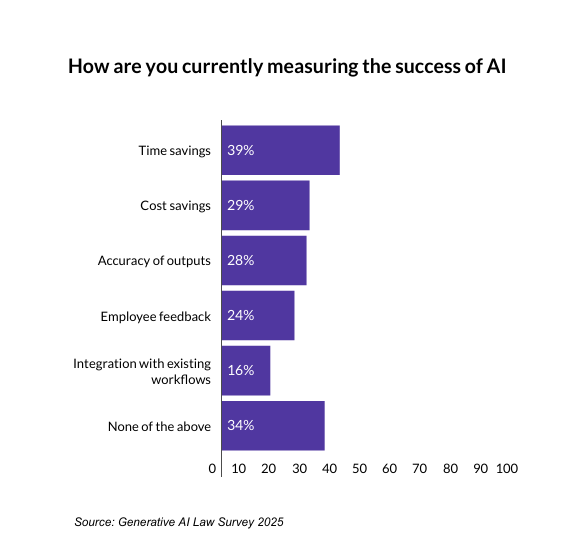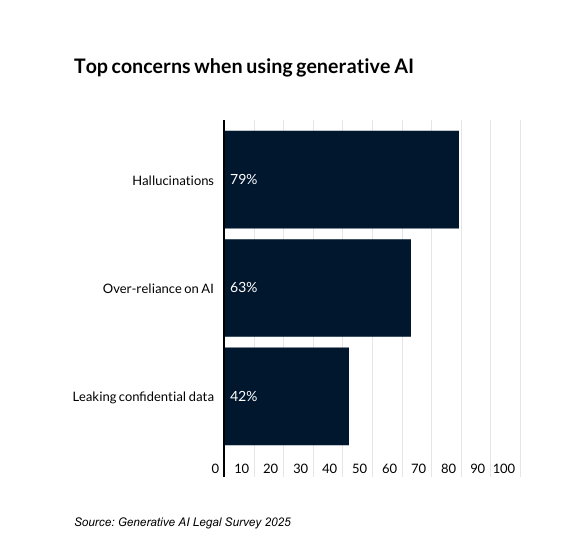The tipping point: Measuring the success of AI in in-house legal departments
AI adoption is accelerating, but legal teams risk falling behind. Without clear success metrics, talent will leave, and opportunities will be lost.

AI is already transforming the day to day lives of in-house lawyers – but are their legal departments keeping up?
Adoption is rising, but implementation is lagging. As AI reshapes the legal profession, organisations that move fast will gain an undeniable competitive advantage, while those that hesitate risk losing both clients and talent.
Note: This report looks at results from in-house lawyers only.
Click below for the full report
Our survey of 800+ lawyers reveals that in-house leaders must act now. Not just to adopt AI, but to prove its value, optimise its use and measure its impact.
Without clear AI success metrics, departments risk wasted investment, inefficiency and even an exodus of skilled professionals.
Top findings:
Almost all in-house lawyers are using AI for work
97% of in-house lawyers
are either using or planning to use AI for work purposes
In-house lawyers are eager for greater tech adoption
53% of in-house lawyers
said their organisation is slow or very slow at implementing new technology.
Without tech investment, people will leave
19% would consider leaving
if their organisation didn't adequately invest in AI.
More AI training will increase adoption
Two-thirds (64%) of in-house lawyers
would use AI more if they had additional training.
In-house legal leaders are unsure how to measure impact
A third of all in-house lawyers
said their organisation doesn't measure AI against clear success metrics.

The AI adoption boom
Almost all in-house lawyers are either using or planning to use AI. But are legal departments moving fast enough to keep pace?

Since our last survey in August 2024, AI adoption figures have stayed relatively flat. The percentage of in-house lawyers using generative AI climbed from 57% to 72%, while lawyers intending to use AI dropped from 32% to 25%. The percentage of lawyers with no plans to adopt AI dropped from 10% to 3%.
97% of in-house lawyers are either using or planning to use generative AI
One solicitor and in-house senior advisor told us investing in AI innovation is a no brainer.
"We need to embrace and use technology to do our jobs better, more efficiently and cost effectively."
The key drivers to using generative AI, according to the survey, are delivering work faster (94%), offering a better service to stakeholders (63%), and having a competitive advantage (53%).
Three-quarters of lawyers say the top benefit of generative AI is working faster
A Group General Counsel at an asset-based lender in Bristol says there's a strong need to focus on using technology to enhance labour intensive but low value work.
"Innovating your workflow can do a significant amount of the heavy lifting, allowing lawyers to focus on the strategy and advice where it is really needed."
Despite these very positive steps forward, our survey found many are growing frustrated with the speed at which their organisation is moving. Nearly half of in-house lawyers feel their organisation is slow to act when implementing new technology.
The competitive advantage
It takes action, not just adoption.

In-house teams have been relatively quick to evaluate, implement and integrate AI into their services, but lawyers are eager for their organisations to continue pushing for greater AI-powered innovation. And faster.
Our survey found only 14% of in-house lawyers said their legal team is fast or very fast at implementing new technology, especially AI. Instead, nearing half (53%) believe their legal team is slow or very slow.
53% said their legal team is slow or very slow at implementing new technology
Responding to change and making use of data and analytics are also areas in need of greater innovation. Making use of data and analytics (42%) and responding to change (31%) were also listed as slow or very slow.
Embracing change can be simple. Find out more here.
When asked what would encourage lawyers to use AI more often, two-thirds (64%) said more training, while 45% said better communication around use guidelines. Other commonly expressed answers were for easier integration with existing workflows (43%), and a desire to hear more use cases from colleagues (40%).
Two-thirds (64%) of in-house lawyers said they'd use AI more if they had training
The innovation activities of a legal department should closely align with the organisation's current business goals, says Nick West, Chief Strategy Officer at Mishcon de Reya.
"One legal department's priority might be trying to drive productivity improvements into a high-volume contracting process, whilst another's might be creating a better "legal front door" due to an overwhelming number of requests."
How in-house teams are implementing AI
The top steps in-house teams have taken to implement AI include developing generative AI policies (48%), offering an AI-powered product to staff (44%), and training staff to use AI (28%).
Half of in-house teams have launched an AI policy
Ensuring AI adoption isn’t just about initial enthusiasm; it requires long-term leadership and reinforcement.
When looking to innovate, in-house teams should prioritise immediate value, says Tony Randle, Partner, Client Tech & Service Improvement at Shoosmiths.
"Mapping out the areas that are going to have the biggest positive impact across legal team is the first step."
Randle provided an example. "We identified that building legal tech, including AI, into legal workflows common to most of our practice areas will deliver the greatest positive benefits."
With nearly all in-house lawyers either using or planning to use AI, departments must move quickly beyond basic experimentation. The real differentiator will not be whether departments adopt AI, but how effectively they embed and measure it.
Failing to act on AI isn’t just a missed opportunity, it’s a serious business risk. Departments that lag behind won’t just lose efficiency. They’ll lose their workforce.
The real risk of inaction
Failing to act now could cost you talent.

The data suggests we are at a tipping point. Legal professionals recognise the value of AI, but if they feel their organisations are holding them back from working more efficiently, they may look elsewhere for opportunities. Departments that fail to invest in AI risk not only inefficiency but losing their workforce.
Some expressed concern over the impact that slow or no AI investment would have on their careers. More than a third (38%) said their career would be negatively impacted if their organisation failed to embrace AI, while 19% said they would consider leaving if their organisation failed to embrace AI.
19% of in-house lawyers said they would consider leaving if their organisation didn't adequately invest in AI
A Group General Counsel at an asset-based lender says:
"We are in an era where traditional skills are unlikely to last you for a whole career and people will have to focus on diversifying their skillset to remain relevant."
This isn't solely about your people and their attitudes towards upskilling. The attractiveness of a workplace is now heavily influenced by the tech tools they have invested in.
If the talent wars have shown us anything, it is that the younger generation of lawyers are just as hungry as previous generations for growth and career development, and they see AI is the catalyst to that growth.
Measuring success
Success depends on measuring the impact of AI.

The top benefit of generative AI is increased efficiency, which has a far-reaching knock-on effect on most aspects of a legal department.
But attributing a precise metric to time saved, risk reduced, or the impact on employees can be a challenge.
More than a third (39%) of in-house respondents said their organisation is currently measuring for time savings, while one-fifth (28%) said they are measuring accuracy of outputs. Others are looking at employee feedback (24%) and cost savings (29%). Only a third (34%) said they aren't measuring any of these obvious metrics, significantly lower than when looking at the legal sector as a whole (50%).
A third of in-house lawyers say their organisation isn't using any of the obvious success metrics
One senior corporate counsel said their organisation measures the effectiveness of AI tools by evaluating their impact on efficiency, accuracy, and compliance.
"Key metrics include time-saved on repetitive tasks, such as contract review or document analysis, error reduction rates compared to manual processes, and alignment with regulatory and ethical standards."
They also pointed out metrics like speed in contract lifecycle management, accuracy in risk identification, and user satisfaction are particularly critical.
Measuring the ROI on AI investment, at this stage, is a real challenge for all across the board.
"Law firms are yet to publish hard data on the level of efficiency gained through using new AI tools because getting tools to a point of adoption where real value can be measured has been a challenge," says Hodgson from Linklaters
This would mean measuring efficiency, accuracy and reliability, data privacy, explainability and interpretability, risks of bias, quality of output, the ability to scale and the lawyer experience, all in real-time, she says.
Sign up to the AI Insider Programme
An obvious metric is whether a tool can speed up work, says Deborah Finkler from Slaughter and May.
"Whilst that’s valid, I think it’s also quite a narrow view. For me, the most important test is whether this technology can allow us to deliver legal advice even more effectively."
The opportunities to create benefits from AI at the moment are huge, and the key point about measurement is to ensure the method and target of measurement support the use case and the underlying objectives, says Mark Smith, Director of Strategic Markets at LexisNexis.
Balancing the risks with the rewards
We all know about the risks of AI, but how are in-house lawyers overcoming them?

Unsurprisingly, many lawyers expressed concerns about the perceived risks of using AI. Hallucinations were the top concern (79%), followed by leaking confidential data (63%) and individuals becoming too reliant on AI (42%).
The end goal, however, shouldn't be 100% accuracy for everything, says West from Mishcon de Reya.
"It's unfair to expect AI tools to achieve 100% accuracy where humans don't; a more sophisticated view is whether the tool can deliver a good enough output, or whether the tool can help lift the quality of a junior employee's work closer to a more senior employee."
Interestingly, three-quarters (78%) of in-house respondents said they would be somewhat or completely confident using AI-powered tools grounded in legal content sources.
Almost three-quarters of UK lawyers would be more confident using AI tools grounded in legal content sources
Final thoughts: The time to act is now
AI is already transforming the practice of the law, but whether legal teams emerge stronger or struggle to keep up depends on the choices they make today.
The tipping point is here. Those who embrace AI strategically and measure its success will gain a lasting competitive advantage. Those who hesitate risk inefficiency, talent loss, and falling behind in an AI-driven profession.
Leaders must act now: ensure AI adoption is purposeful, prove its value, and create a clear measurement framework. The future of the law won’t wait.

Methodology

The survey was conducted among legal professionals in the United Kingdom and Ireland from January to February 2025. There were 887 complete responses which were recorded and analysed. Surveys were conducted in English.
